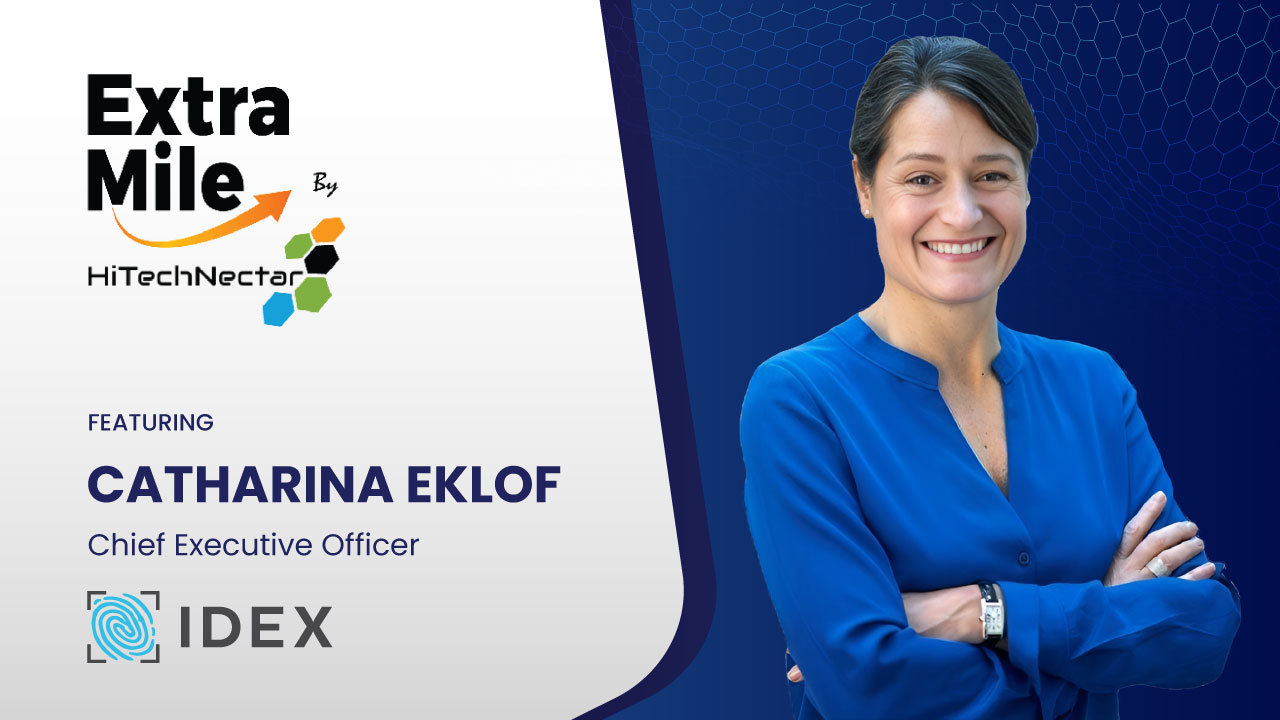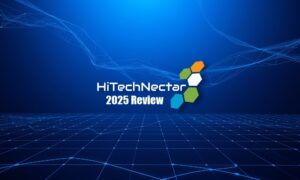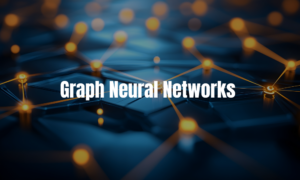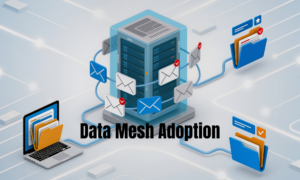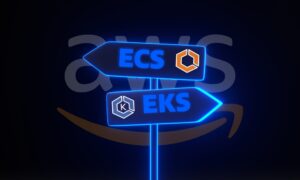Host: Hello everyone, welcome to another episode of Extra Mile by HiTechNectar, an interview series that bridges the gap between industry leaders and enthusiasts.
I am your host, Sayali, and we’re here to discuss the latest innovations, tech trends, marketing practices, expert insights, and a lot more. In today’s conversation, we’re thrilled to host Catharina Eklof, CEO of IDEX Biometrics, a distinguished provider of fingerprint identification technologies.
With more than 20 years of professional experience, Catharina has been a cornerstone for diverse companies’ success. Let’s indulge in her professional journey so far and get insights into the dynamics of biometric identification.
A very warm welcome to Catharina, thank you so much for joining us today.
Catharina: Thank you, it’s very nice to be here.
Host: So, Catharina, congratulations on becoming CEO of IDEX Biometrics, that’s a huge accomplishment. How do you plan to use your experience as Chief Commercial Officer to help IDEX grow and stay ahead in the biometric industry?
Catharina: So, first of all, thank you very much, I just want to get everyone comfortable with biometrics. So, what IDEX Biometrics provides is a trusted identity for all and this is something that all consumers around the world today are looking for are somewhat struggling with in the multifaceted world that we live in. So that’s sort of the foundation of IDEX.
My contribution to this is I come from a background of a career in financial services, and I’ve always been focused on customer centricity. I have worked across five different industries and I joined the biometric industry in 21, as you said, as co-chief commercial to accelerate and support this company and bring it from a research and development company that was just on the cusp of launching its products, help it strategize and actually ensure that the product that went into market had a real resonance with the consumer groups in the diverse geographies that IDEX was focusing on.
And it’s also about developing the best solution for consumers to protect themselves, their data, their payments, all in one card. And I would say I have more than 10 years’ experience of rolling out contactless payment solutions for Mastercard, both consumers and merchants globally.
I’ve gathered deep knowledge in consumer adoption requirements, very long experience in understanding what does it take to roll out the technology solution, to actually get real adhesion and that consumers actually think this is something that I’m going to use every day. And I’m convinced that biometric cards will be one of the preferred solutions for consumers as the experience is really about a seamless, convenient and peace of mind experience. So, in order to ensure that we get worldwide adoption and a unified way of paying with biometric solutions, I have taken my practice from previous experiences of bringing in a global advisory board.
And how do I do this? Well, I work with banks, I work with industry leaders, I work with institutions. So, then, we take it outside in perspective, which is very, very important.
And the market perspective, of course, a market like India is very different than a market like Norway in Europe. So, I would say we gather user experience. We also, I have worked a lot with customers, I would say customer, deep customer research and active customer participation.
So, a real adoption area that I’ve taken also from my experience with contactless is that enrollment process, when you actually register your fingerprint needs to be seamless and careful. So here, I’ve also brought in my knowledge of bringing solutions that are standardized, that is a recipe for scale. So, we work with the large global organizations like MasterCard, Visa, we work with other regional and domestic organizations to actually ensure that we comply both with legal and regulatory requirements, as well as domestic requirements.
So that is experience that I have brought in for my work in both cybersecurity and in payments.
Host: So, for almost 20 years, you’ve transformed businesses across various industries, as we know, you share some of the most valuable lessons you’ve learned along the way, and how they’ve influenced your enterprising journey.
Catharina: Mm hmm. I think one first thing is really about having agile teams, I would say, a company is its people. And everyone needs to understand what the end game, what’s the mission, where are we heading? And what are the boundaries? So have a very, very focused approach. And the second thing is also understanding that you need to have a blueprint that you can duplicate.
So, one methodology that that has core elements, so I had the fortune of leading product development in three different organizations, I’ve had the privilege of actually bringing out solutions to widely global, different regions, so to markets like India, to Africa, to Russia. And with that comprehension, I think I have a good base that I integrate with with competence, both engineering competence, go to market competence and stuff.
So, it’s really about creating a team, understanding where is the products limitations, what do we need to do in order to adapt it, so it fits the market context.
And then lastly, work with the markets.
Host: Great experience contributes to becoming the influential professional you are. So IDEX Biometrics is bringing biometric authentication to Indian payment cards. As we spoke about it earlier, could you elaborate on the specific benefits and challenges of this technology in India?
Catharina: Absolutely. So, I think most and certainly you know, India is the market in the world where biometrics has been part of the Indian Indian people’s lives with the system other identification system. So, it’s well ingrained.
Indians are also very, very tech savvy. So, there is an understanding of what biometric means that using and especially fingerprint biometrics, India was first with this to bring it out on such an enormous scale.
So, the step for the Indian market with a market population of north of 1 billion people, with an economic situation where the Indian government is really driving and digitizing India and bringing on all parts of the ecosystem from ensuring a secure environment, bringing people on to a digital life.
So, bringing them into both acting in in the virtual, so on web, online, but also securing that the physical environment that the daily interaction of payments is secured. The RBI has come out with with a mandate to say we need to reinforce what’s called multifactor authentication. And it means that you need to have two devices.
So, you need to have either something that you are something that you have, and something that you can link these two together. So what IoTeX has done in India, we have performed market research, of course, because we want to understand the Indian landscape. And there is a big base of growing affluent consumers.
And just to give you some highlights from this research, first of all, this research has performed over 20 markets in India, just the Indian consumers really sets the top place of how they regard biometrics. So, 94% are tech adopters, and a high portion of international travelers, and they’re interested, 97%, it’s like almost too good, are interested in biometric payment cards. And why is that?
Because the sentiment is that they, some are using contactless payments, you know, when you when you do the tap and go. But the level in India is still only today 11%. So, 11% of the transactions in India are contactless versus a standard in in the sort of other hemisphere, like like Europe and the US, where levers are at 50%.
So, there is a there’s something that holding them back. When we speak to our banks, they’re saying, there is a reticence, and there’s also an insecurity around what if, what if I lose my card, what if someone intercepts, so that reticence, there is there is an appetite for have something that secures this. And so, they’re interested, and they have the background from other so so the connection to link the two putting my fingerprint in an understanding that this is an offline proposition.
So, my data is protected on the card, it’s quite easy for it for to put together. And the interesting thing also, the consumer thinks that they will be willing to pay for this, they think increased security is value for money. So that’s the foundation.
So, what IDEX have done so far, we have been working together with institutions, strong innovators, we have a strong partner, which is called KL Hitech. It’s one of the Indian smart card manufacturers and innovation leaders in actually both identifying and working with the right banks, and also other parts of the ecosystem to bring this solution to market. So I had the chance actually to try a biometric transaction in Pine Labs, which is a big acquirer.
So that was very good. And we’re now bringing where we’re taking the solution and working with the industry to implementing this as a second vehicle. So, it’s not about mobile or card, the Indian consumers are very clear, they’re saying we want contextual solutions.
And what does that mean? Well, it means that depending on what I do, I might going to use my card, I might want to use my mobile, I might want to want to pay with with direct transfers, but it’s not about one or the others. And this is the first time that we hear consumers being so clear.
Contextual usage is what the Indian consumer is looking for safe, seamless, and easy.
Host: Absolutely. You know, I personally vouch for when you mentioned that there is this huge resistance for the tap and pay go. So, I’m sure IDEX Biometrics is here to help us out.
Catharina: Thank you.
Host: So Catharina, how important are strong relationships with customers and partners for a global business? And what are the key things companies need to build and maintain those relationships?
Catharina: So, I will say for IDEX, which is a technology company, we are bringing the technology to a market for us absolutely critical to have a good strong base of deep relationships, where we can both work in collaboration, and also have these partners as actually fronting the market. So for us, this is part of the core recipe. So we have a good base.
And we were talking about India, some strong partnerships in place. And that’s actually our business model, we are live in Korea, we work with a with a Korean partner that’s called Kona Eye, they work all over the world. We have security solutions with a partner called Authentrend.
So, they sell the solution out in regions like Africa, America, all over Japan, Taiwan. So, the partners are critical for IDEX to get the reach into the customers. And it’s also we’re bringing out security solutions, the technology in itself is validated.
So, when you say how important is partners, partners is number one, but getting the the official endorsement from regulators is the second pillar. So we have done this in Turkey, we have done this in Bangladesh. And we are in the progress with with the Indian institutions to actually get the technology approved.
Host: So, as we all know, IDEX is known for its biometric authentication solutions. So can you tell us about some of the key features and innovations that make your solutions stand out from the competition?
Catharina: So, our biometric solution, so for all the listeners, a biometric card is a payment card, all of you are used to using a tap card, contactless, or you pay into a terminal and put in your code. The uniqueness with this card, it has no battery, it has a fingerprint sensor, which actually registers your fingerprint in six touches. This fingerprint is converted to a digital template that is stored in what’s called the chip or the secure element.
So, see like you have your bank vault on your card, no one can interfere, no one can actually break into this and copy because the fingerprints is converted to a it’s called hashed and encrypted. So, it means that it can’t be broken into. Now, what does that do to the consumer experience?
Well, the actual transaction happens in less than half a second where you both verify yourself as your identity and do the payment. So, it is as fast as just a regular contactless transaction. We’ve also ensured our uniqueness is that we have a large sensor and this means that when you hold the card in your different manners, we have such a large area, so we only need part of your fingerprint.
You have to do this in an ergonomically natural way. So, we’ve spoken more than 10,000 people are in our database that actually are testing on a continuous basis to improve the customer experience. So that’s one thing.
Beyond that, we work with and if you look in the security environment, the same card is used, but the use case here is giving employees, government officials access to web system logins and physical access. Because here in the world today, when people live in a hybrid environment, it becomes essential for enterprises and governments to actually have a notion of is the person entering opening systems, accessing data, we need to understand that this is really the person. So, it’s become more hard with a fingerprint authentication.
There is no way to give your card, your access card, there is no pin to be given. So, if you try and use it, or give it to your family member, it does not work. So, it has security benefits for the consumer.
It has benefit for society. But foremost, I think it’s also one of the most important benefits that IDEX does is that we build solutions together with our partners, where we integrate. So, I was talking about the advisory group, we have, we are just in the process of launching together with an English partner that’s called TaluCard.
So, this is a solution that actually helps elderly, visually impaired, memory impaired, with a solution that as the payment environment is getting more modernized, many times, if you look at the payment terminals out in the real space, they’re just a blank screen. So, if you don’t see really well, or if you’re a little bit stressed, this creates an impediment. So, people become reticent here.
Together with TaluCard, we have developed a card that is the biometric card as a basis, there is a tactile markers, so you feel so you don’t have to look and in dialogue with your mobile, you get indication of the amount, and the mobile is steering you auditively, so you hear, and then you use the card. So this, of course, is not exclusively for this group, but it’s a solution that’s been developed together with the European Association for Blinds, the Royal National Institute for Blind, and we’ve also tested it on honor. So IDEX works really in collaboration to actually develop something that’s not only an end functionality, but is an integrated experience.
So, I think that’s that’s the uniqueness of IDEX that we think holistically, and always consumer centric.
Host: That’s visionary. Given the fierce competition in biometric authentication, what is your long-term vision for your company and its leadership position right now?
Catharina: That’s a, that’s a, I would say a $200 million question, and very exciting, right? So first of all, IDEX Foundation is both hardware and software. I myself come from a background of having developed software as a service.
And the fascinating thing with IDEX software is that it’s highly scalable and has already today, IDEX on this card have our own operating system, which enables us to actually provide solutions, and it’s an open platform. So, in the future, we are already today starting to build solutions that’s going to be only pure software. And if you think of a normal operating system, a Microsoft or Apple operating system, app developers and different type of partners can build on to this operating system.
So, that’s the same philosophy that we’re building out. But we’re also seeing diversification once we are launching our first solutions. Amazing.
Host: So, Cathy, now how do you ensure providing highest level of security while also delivering a seamless and convenient user experience? How does it go hand in hand?
Catharina: So first of all, the essence of this, delivering security while making it seamless, is based on the biometric algorithm. So, it’s first of all, you actually put your finger on the sensor and that needs to be very fast, very secure. So, we take 150 data points that we convert into this digital template.
It is a minute process and requires edge computing and application of artificial intelligence. Already that, the way the data is structured and encrypted means that it’s non-interceptible. So today, when you say highest level of security, IDX products are certified by MasterCard and Visa and the payment industry have the highest level of security.
So, there are deep tests that are only dedicated to actually try and intercept and break up the solution, which is of course, when you go through the certification, it means that your solution is safe. So that’s the first on security. When we talk of seamlessness, the actual fast activity and that there is the consumer feels that I can use this payment card or this access device in a natural fashion, that requires customer adoption.
So, we work with IDX Customer Lab to actually ensure that continuous improvement. We look in different environments. So, we’ve tested on Mexican field workers.
We have tested on old people. We have tested on young people. We have tested on people from different geographies.
So having that global view has been one of the differentiators for IDX. And also taking in feedback and partnership from all this. We talked about how we work in a network of partners has been a critical success factors.
And from the beginning, when IDX was more of a hardware-based company, the company had to depend on other parts of the value chain to bring the product to market. I think our big differentiator is that we have now brought in competencies, and I would say knowledge from the outside that actually can accompany these different entities that want to take this product to market. So that has been a key differentiator that we actually bring an end-to-end solution to our customers and partners.
Host: So lastly, and yet important, can you elaborate on how your commitment to purpose driven leadership and a strong company culture has influenced your decision making and overall leadership style?
Catharina: So first of all, I have worked with the company and being part of the management team and shifting a company from one direction where this company was focused on hardware to actually emphasize and structure it towards a software company has really been a fantastic journey. I have the privilege of working with some of the world’s best engineers and the wonderful thing with engineers is that they’re very logical and very practical. So, I think having the purpose and everyone in IDEX has one mission.
We are going to provide trusted identity for all. This is the most purpose driven you can be as a company and we’re not a large company. I think we have more than 20 nationalities in our company.
So, we have no place for hierarchy. We have no place for bureaucracy. We have to work very fast. We have to be very agile. And that requires constant modification, constant dialogue, but foremost understanding what is the target? How do we work together? And how do we also learn? We fail and we stand up again. If you look at an engineering principle, it’s testing, testing, testing.
So that’s one thing. And another thing that’s close to my heart is that this is a very specialized industry, and I have the privilege of having young female engineers coming into IDEX. So normally this engineering and computer science is very male oriented.
And unfortunately, when you look at research today, it’s not so that the female population of engineers are increasing. On the contrary, it’s stagnant and in some countries even decreasing. So if IDEX and we who are the female leadership can bring inspiration and show that there’s a platform of young engineers that actually are part of bringing this out to the world, I think that’s fantastic.
And if I can support and be a mentor, I have worked with mentorship over the last 15 years in all the different companies that I’ve been in. So, for me, it’s really about promoting talent. So that’s also something that we drive in IDEX and we work with universities in England to actually bring in these young talents.
So, we’re really focusing on that. And the last point is really about inclusivity. The world is driving towards a bifurcation, a division between rich and poor.
And we are committing to really building technology that will drive payment inclusion and will drive across age, across population to actually ensure that it’s a vehicle that feels easy, that I don’t feel apprehension or nervousness, but I feel safe and I can use this and it also keeps my dignity. So, I think this inclusion is very, very part of IDEX core, how we drive our company forward.
Host: Big answer. So just to end this on a light note, if you weren’t in the tech world, what other career could you see yourself in if it wasn’t the tech industry for you?
Catharina: If I wasn’t in the tech industry, you know, I’m going to tell you something funny. I would probably be in the gardening industry because I have a passion and I will tell you a funny story that when I was in India now three weeks ago, I’m always curious to look at trees because trees are amazing, you know, they live several hundred years and there’s a perpetuity and trees are some of the most important things for keeping, you know, the climate balance. So, I’m curious.
So, I actually asked my Indian colleague to say, I see this beautiful Indian tree, can you see if we can get a seed and I can bring it to France where I live? And I actually planted this seed and he told me, Kat, you have to put the seed in a banana peel because that’s how we do in India for the seed to grow. And today, this little seed is a mini tree.
So, three months later, there is an Indian tree standing in France. So that’s probably what I would be doing. I’m getting quite interested in getting all these plants from different parts of the world.
Host: That’s the best souvenir you can get for yourself, I guess. Thank you, Catharina, for sharing your insights with us today. Your experience and knowledge about the industry is truly unmatchable.
Additionally, it was interesting to learn about the elemental strategies of IDEX Biometrics from the firm’s excellent leader. Thank you so much.
Catharina: Thank you so much for having me.
Host: Thank you, everyone, for joining us today. I am your host, Sayali, signing off. See you soon in the next episode of Extra Mile by HiTechNectar with our next extraordinary leader on board, sharing their thoughts and knowledge. So, please stay tuned.
Explore Our Other Insightful Interviews:


